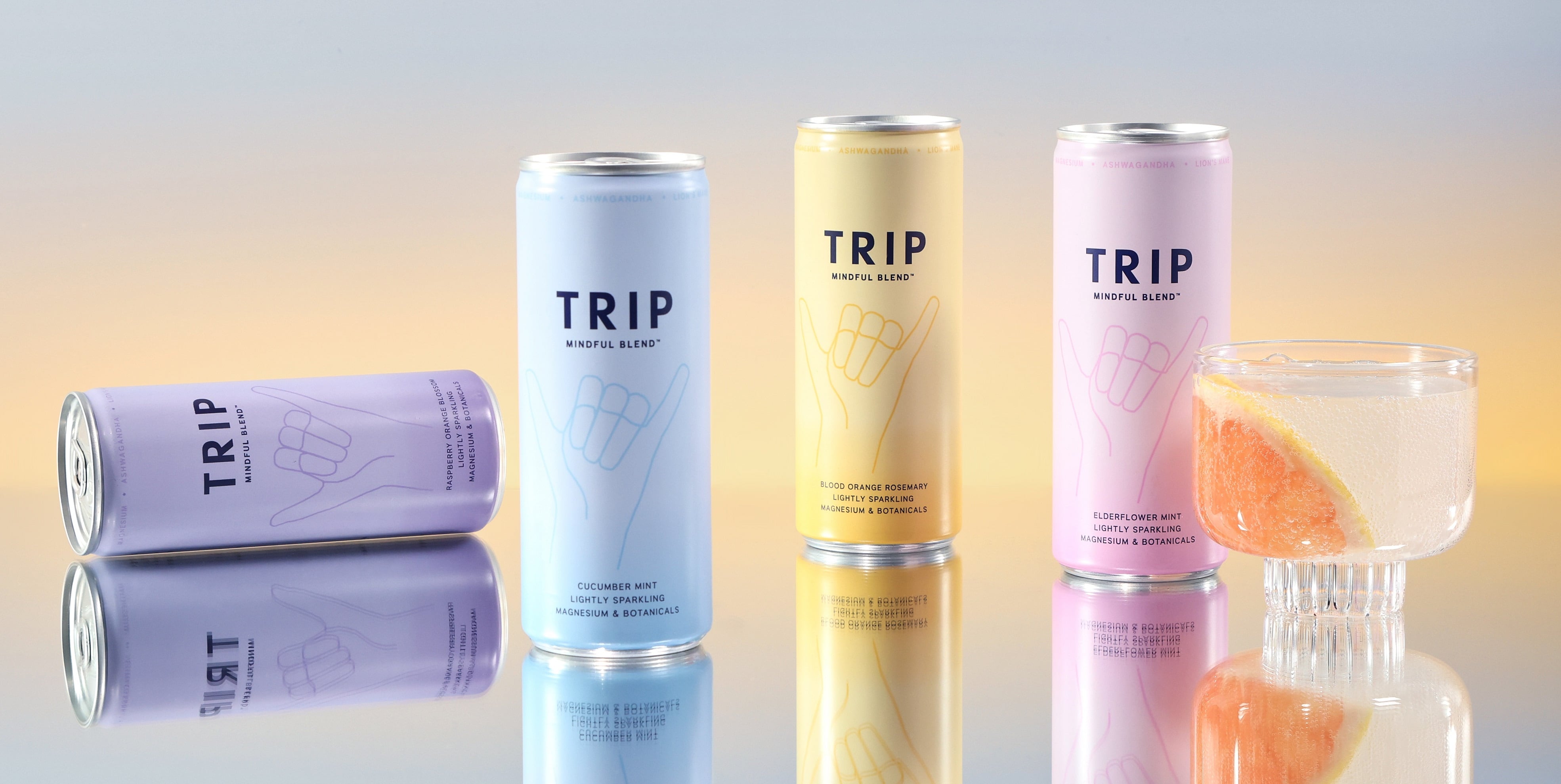Trip launched in 2019 and quickly rose in popularity for its botanicals and CBD or magnesium-infused drinks that consumers saw as an alternative to alcoholic beverages, thanks to the influencer marketing strategy of the brand that partnered with vocal advocates for alcohol-free living.
Its unique selling proposition is a focus on relaxation and well-being, but now, the brand has been called out for claims that its Mindful Blend drink, containing magnesium citrate, spearmint, lemon balm, chamomile, ginseng and lion’s mane extract, could reduce anxiety and stress.
What is the ASA ruling against Trip for?
Trip promoted its Cucumber Mint Mindful Blend Magnesium Drink on its website in December 2024 with an ad that claimed the product helped consumers “feel calm” and reduce poor mental health.
After a complainant challenged the accuracy of the product’s sugar-free claim, the ASA also investigated whether the ad improperly suggested the drink could treat anxiety and stress, potentially implying it could prevent or cure disease.
The authority ruled that the Trip’s claims that magnesium and other ingredients promoted calmness and reduced cortisol levels classified as specific health claims. These claims were not authorized on the GB Nutrition and Health Claims Register, and as Trip did not provide authorized evidence, the ASA found the claims violated advertising regulations.
ASA also took issue with the suggestion that the drink promoted the “mental health” benefits of lion’s mane, which they concluded implied the drink could treat or prevent disease, something food products are not legally allowed to claim.
This resulted in the ASA banning the ad in its current form and instructing Trip not to make disease treatment claims in food advertising and to only use authorized health claims from the GB Register.
Magnesium health claims for stress
So was the ASA ruling avoidable? Potentially yes, as there are several claims that could be tied to the product.
Speaking to NutraIngredients, Luca Bucchini, managing director at food safety consultancy Hylobates Consulting, authorized claims such as “magnesium contributes to a reduction of tiredness and fatigue” and “magnesium contributes to normal psychological function” align with the product’s focus in a sense.
The communication on the product could have been built around flavor, freshness and the authorized claims for magnesium and general health claims associated with the specific benefits, Bucchini noted. The presence of other ingredients could have then been mentioned but with no link to health benefits.
“When you have minerals or vitamins in the product, there is a good foundation to communicate the benefits of the products that other substances may contribute to, although there are no authorized claims; consumers may associate ashwagandha with its adaptogenic benefits from personal knowledge, even if the label or ads do not say so,” he said.
This common practice in which brands include ingredients that have approved health claims, such as those recognized by the EFSA, in order to communicate the product’s use, is known as ‘ingredient stacking’.
In this case, a claim like “magnesium contributes to a reduction in tiredness and fatigue” could have more appropriately positioned the product beneficial for addressing tiredness.
“With creativity, it is possible to build a convincing message within the limits of the regulation, although perhaps not as appealing as marketers would like to see,” Bucchini said.
Defending the product
Dr. Mark Tallon, managing partner at the Food Law consultancy Legal Foods, told NI that the ASA may have upheld the ruling as Trip did not defend the ingredients or related claims made about the product.
“The requirement in law is for the food business to hold data to support and substantiate their claims,” he said. “In the case of the botanicals, this would be primarily from the on-hold list.
“Whilst there were relevant claims from the list that could have been used to defend Trip, they would need to be based on the right dose, peer review data and the exact substance listed as on-hold. This is not to mention the wording used in the marketing being equivalent to that on the list.”
Rachael Matthews, product director at Trip, told NI that the brand would be taking steps to change its advertising of the relevant product in response to the ruling but defended the validity of the statements in the ad.
“All statements regarding the relevant product’s calming properties were based on real-world studies conducted with human participants,” she said.
“We will update our advertising and continue to work closely with regulators to ensure that Trip can continue to educate consumers about the functionality of ingredients in its drinks whilst complying with all applicable regulatory requirements.”
Is cortisol bad?
Reduced cortisol is a keenly trending area of health, particularly on platforms like TikTok, where users reference terms like “cortisol face” and “cortisol belly”—used to described changes in physical appearance linked to elevated cortisol levels and associated stress.
Trip’s cortisol reducing claims therefore may make sense to its target demographic, but it brings up a bigger question about whether that is indeed a health claim that is worth being made, Dr. Tallon noted.
“There will be many companies looking to leverage cortisol as a marketing message or underpinning the efficacy of claims,” he noted. “There are options for cortisol-related claims, but care must be taken on how they are presented. Is a change in cortisol a health benefit?”
He explained that the challenge for brands is finding the balance between a health-beneficial physiological effect and a factual change in the body’s function.
“For example, consumption of protein results in an increase in blood amino acids,” he said. “Is that a health benefit? If it is, say, ‘protein results in a rise in blood amino acids that support muscle growth’, then there is more clarity of it being a health benefit. Here lies the art of the health claims interpretation.”


